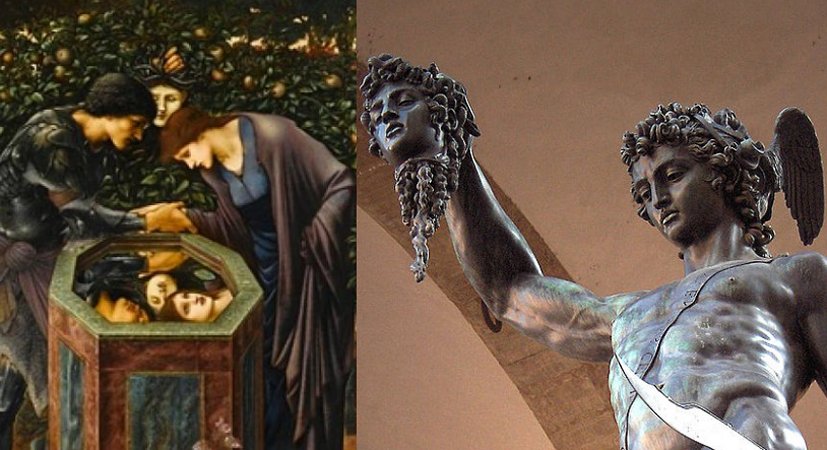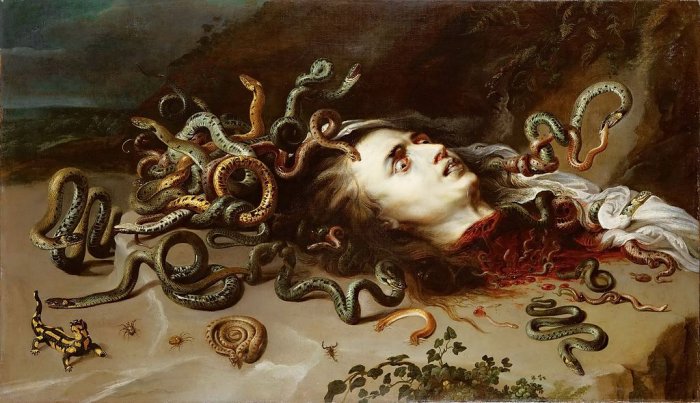Perseus – Courageous Adventurer Who Fulfilled A Prophecy
David Tee - AncientPages.com - Not all of these stories are exaggerated to meet the reader's or listener's fantasy needs. Many legends and myths could be based on actual events.
Not all of these stories are exaggerated to meet the reader's or listener's fantasy needs. Many legends and myths could be based on actual events.
Left: Edward Burne-Jones: The Baleful Head, 1885, Staatsgalerie Stuttgart. This part of the series plays with the theme of the reflected gaze, as Perseus has Andromeda look at the Gorgon's head, but only as reflected in the well. Credit: Public Domain - Right: Perseus by Benvenuto Cellini, Loggia dei Lanzi, Florence, Italy. Credit: Public Domain
It means that while Perseus may not have been a child of a god or had access to magical powers, he may have been a mortal person who did courageous acts.
As far as can be ascertained, the tales of Perseus and his adventures are among the oldest Greek legends.
Who Was Perseus?
Perseus' story starts with his grandfather, Akrisios (or Acrisius), a Greek king of Argos who went to the Oracle at Delphi because he did not yet have a son to succeed him. The Oracle gave him a prophecy that his grandson would kill him. Horrified by this prediction, he hurried home and locked his only daughter Danaë in an underground chamber made of copper so the prophecy could not come true.
Acrisios believed this fortification was safe enough, but Zeus had other ideas. As the story goes, Zeus transformed into golden rain and could enter the jail without detection. As a result of Zeus's and Danae's union, Perseus was born.
When the King learned about the birth, he was horrified because the prophecy could come true. He decided to get rid of the daughter and grandson. He locked them both in a coffin, which he threw into the sea. Instead of drowning the two, the waves brought the coffin towards the island of Seriphos, where they got caught in Dikty's fishing net. Diktys was the brother of Polydectes, the ruler of the island. Both Danae and her child were received with great hospitality.
Seriphos island became a new home for Danaë, and Perseus was given a safe place to grow up. As Perseus grew, King Polydectes fell more and more in love with his mother, Danaë. As soon as Perseus reached adulthood, Polydectes did everything to eliminate the patron son. He managed to trick the youth into trying to kill the monster Medusa and then bring her head back to the King as evidence, believing that the boy would be killed on the way.
Medusa was a well-known monster as she petrified everyone who looked at her.
Peter Paul Rubens - The severed head of Medusa. Painting created 1617-1618. Credit: Public Domain
Perseus did not like the new attention paid to his mother, so he guarded her 24 hours a day. Even though he was as strong, wise, and gifted as Zeus' other children, he could not always protect her. It led to the beginning of his many great adventures.
After a long and eventful adventure, Perseus managed to fulfill his mission using his cunning and strength with some help from the gods. Athena and Hermes decided to help Perseus. They gave him a gold shield and a helmet that rendered Perseus invisible. They also gave him a unique bag to hold Medusa's head once it was severed.
Perseus Rescues Andromeda
After fulfilling his boast, Perseus started his voyage home to save his mother from Polydectes. On the way home, he saved princess Andromeda from a sea monster and married her.
Andromeda was beautiful, and her father, Cepheus, boasted that her looks surpassed all women, including the Nereids.
It angered Poseidon, who sent a flood to damage Ethiopia and sent a sea monster to bother the country. The only way to be free from these punishments was for the King to sacrifice his daughter, Andromeda. The King chained his daughter to a rock and waited for the sea monster to take his daughter away.
But love wins out. Perseus fell in love with Andromeda the moment he saw her. He offered to save the girl and destroy the sea monster if he would be given Andromeda in marriage. The King agreed.
Perseus still had his gifts from the gods. He used them to get the sea monster in the proper position, and then he pulled Medusa's head out of its unique bag. The curse of Medusa still worked, and it worked on sea monsters as well. The creature was turned to stone. Perseus had almost saved Andromeda.
He did not know that Andromeda's uncle desired her by himself. It did not please Perseus, as Andromeda was now to be his wife. His bride-to-be plotted with Perseus to defeat her selfish uncle. But in this battle, Perseus had human help.
Working hand in hand, Andromeda and Perseus got her uncle to look at Medusa's head. When his eyes fell on the ugly face, he was turned to stone immediately.
In his absence, Polydectes harassed and bothered Perseus' mother. Displeased by this news, Perseus did not waste much time using Medusa's head again. When Perseus presented the head to the King, he positioned it so the King could not avoid Medusa's cursed stare.
Polydectes immediately turned to stone.
A Prophecy Is Fulfilled
It is not known if Perseus was aware of the prophecy or not. The myths do not say. However, upon hearing of the exploits of Perseus, Acrisios fled. He feared that his grandson would dispatch him as he had done to Andromeda's uncle and Polydectes.
Perseus competed in an athletic competition held in Larisa in Thessaly. He would throw a discus, which accidentally hit Acrisius, killing him. The fleeing did not help Acrisios. The prophecy of the Pythia had come true.
Perseus and Andromeda went on to rule in Tiryns and founded the city of Mycenae. They had four children, one of whom had a son named Hercules.
Written by – David Tee - AncientPages.com
Updated on January 5, 2023
Copyright © AncientPages.com All rights reserved. This material may not be published, broadcast, rewritten or redistributed in whole or part without the express written permission of AncientPages.com
Expand for referencesTyrell, J. Ancient Greece
More From Ancient Pages
-
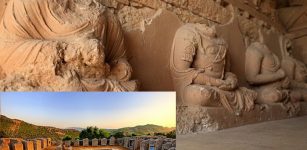 Takshashila: Renowned Learning Center That Attracted Buddhist Masters, Disciples And Students Of The World
Featured Stories | Sep 13, 2021
Takshashila: Renowned Learning Center That Attracted Buddhist Masters, Disciples And Students Of The World
Featured Stories | Sep 13, 2021 -
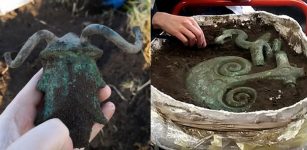 Mysterious Kallerup’s Double-Headed Figurine – Evidence Of Unknown Norse God Or Worship Of Roman God Janus In Ancient Scandinavia?
Artifacts | Mar 19, 2020
Mysterious Kallerup’s Double-Headed Figurine – Evidence Of Unknown Norse God Or Worship Of Roman God Janus In Ancient Scandinavia?
Artifacts | Mar 19, 2020 -
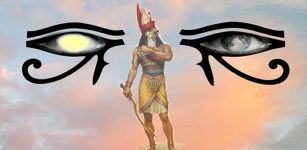 Horus – One Of The Most Important Ancient Egyptian Gods And Symbol Of Rulership and Justice
Egyptian Mythology | Jun 26, 2018
Horus – One Of The Most Important Ancient Egyptian Gods And Symbol Of Rulership and Justice
Egyptian Mythology | Jun 26, 2018 -
 Mysterious Cave With Giant Skulls Decorated By The Neanderthals Discovered In Spain
Archaeology | Jan 27, 2023
Mysterious Cave With Giant Skulls Decorated By The Neanderthals Discovered In Spain
Archaeology | Jan 27, 2023 -
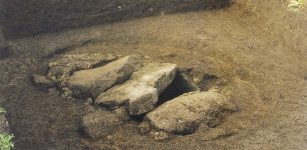 Mystery Of The 2,000-Year-Old Grave On The Isles Of Scilly Solved!
Archaeology | Jul 28, 2023
Mystery Of The 2,000-Year-Old Grave On The Isles Of Scilly Solved!
Archaeology | Jul 28, 2023 -
 On This Day In History: Island Of St. Helena – Last Residence Of Napoleon Discovered – On May 21, 1502
News | May 21, 2016
On This Day In History: Island Of St. Helena – Last Residence Of Napoleon Discovered – On May 21, 1502
News | May 21, 2016 -
 Algonquin People And The Myth Of The Medicine Woman In The Moon
Featured Stories | Feb 1, 2016
Algonquin People And The Myth Of The Medicine Woman In The Moon
Featured Stories | Feb 1, 2016 -
 Battle Between The Good And Bad Mind Over Human Souls – Told By The Iroquois Tribes
Featured Stories | Oct 25, 2021
Battle Between The Good And Bad Mind Over Human Souls – Told By The Iroquois Tribes
Featured Stories | Oct 25, 2021 -
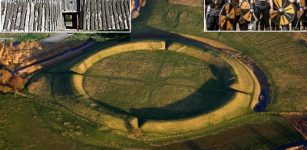 Great Viking Fortresses Built By King Harald Bluetooth
Featured Stories | Dec 12, 2022
Great Viking Fortresses Built By King Harald Bluetooth
Featured Stories | Dec 12, 2022 -
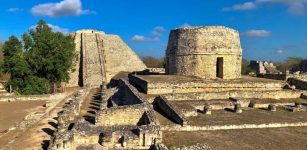 Climate, Conflict, Collapse: How Drought Destabilized The Last Major Precolonial Mayan City
Featured Stories | Jul 25, 2022
Climate, Conflict, Collapse: How Drought Destabilized The Last Major Precolonial Mayan City
Featured Stories | Jul 25, 2022 -
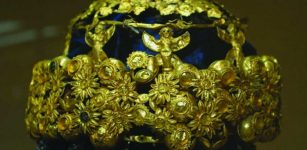 Long-Lost Mesopotamian Queen Hama Discovered By Student Just By Reading Books
Archaeology | Feb 14, 2019
Long-Lost Mesopotamian Queen Hama Discovered By Student Just By Reading Books
Archaeology | Feb 14, 2019 -
 Mysterious Giant Rock Face Discovered On B.C’s Central Coast – Natural Or Man-Made Structure?
News | Mar 28, 2020
Mysterious Giant Rock Face Discovered On B.C’s Central Coast – Natural Or Man-Made Structure?
News | Mar 28, 2020 -
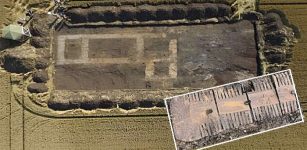 Lincolnshire’s Prehistoric Henge And A Sacred Site Dating Back Hundreds Of Years
Archaeology | Apr 6, 2024
Lincolnshire’s Prehistoric Henge And A Sacred Site Dating Back Hundreds Of Years
Archaeology | Apr 6, 2024 -
 Illuminati: Facts And History About The Secret Society
Featured Stories | Mar 30, 2017
Illuminati: Facts And History About The Secret Society
Featured Stories | Mar 30, 2017 -
 Rare Coins Found In A Dead Sea Cave Offer First Solid Evidence For The Maccabean Revolt 2,200 Years Ago
Archaeology | Jan 2, 2023
Rare Coins Found In A Dead Sea Cave Offer First Solid Evidence For The Maccabean Revolt 2,200 Years Ago
Archaeology | Jan 2, 2023 -
 Significance Of Secret And Powerful Number 108 That Has Accompanied Humankind For Thousands Of Years
Ancient Symbols | Jun 19, 2017
Significance Of Secret And Powerful Number 108 That Has Accompanied Humankind For Thousands Of Years
Ancient Symbols | Jun 19, 2017 -
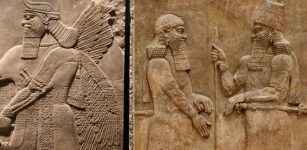 Treasure Trove Of Assyrian Kings Found In Tunnels Excavated And Plundered By Terrorists
Archaeology | Apr 20, 2020
Treasure Trove Of Assyrian Kings Found In Tunnels Excavated And Plundered By Terrorists
Archaeology | Apr 20, 2020 -
 Mysterious Judaculla Rock And The Slant-Eyed Giant Of The Cherokee
Featured Stories | May 8, 2021
Mysterious Judaculla Rock And The Slant-Eyed Giant Of The Cherokee
Featured Stories | May 8, 2021 -
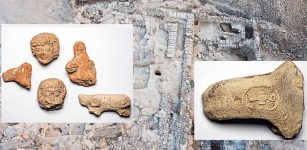 Kingdom Of Judah: Government Complex And 120 Seal Impressions Stamped On Jars – Unearthed
Archaeology | Jul 23, 2020
Kingdom Of Judah: Government Complex And 120 Seal Impressions Stamped On Jars – Unearthed
Archaeology | Jul 23, 2020 -
 Legendary Ynglings: Descendants Of The Norse Gods And Oldest Scandinavian King Dynasty
Featured Stories | Mar 4, 2023
Legendary Ynglings: Descendants Of The Norse Gods And Oldest Scandinavian King Dynasty
Featured Stories | Mar 4, 2023

